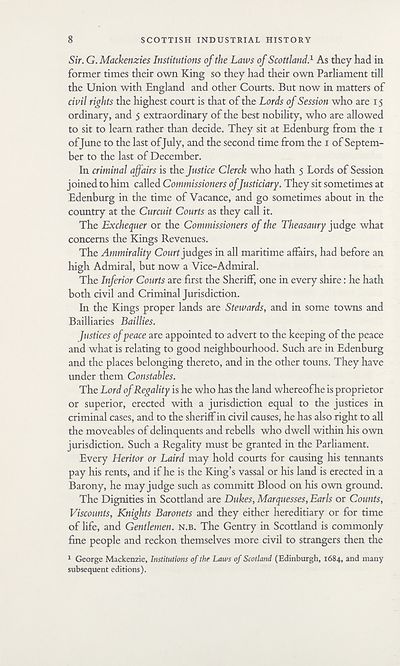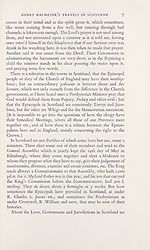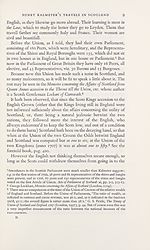Series 4 > Scottish industrial history
(53) Page 8
Download files
Complete book:
Individual page:
Thumbnail gallery: Grid view | List view

SCOTTISH INDUSTRIAL HISTORY
Sir. G. Mackenzies Institutions of the Laws of Scottland.1 As they had in
former times their own King so they had their own Parliament till
the Union with England and other Courts. But now in matters of
civil rights the highest court is that of the Lords of Session who are 15
ordinary, and 5 extraordinary of the best nobility, who are allowed
to sit to learn rather than decide. They sit at Edenburg from the 1
of June to the last of July, and the second time from the 1 of Septem¬
ber to the last of December.
In criminal affairs is the Justice Clerck who hath 5 Lords of Session
joined to him called Commissioners of Justiciary. They sit sometimes at
Edenburg in the time of Vacance, and go sometimes about in the
country at the Curcuit Courts as they call it.
The Exchequer or the Commissioners of the Theasaury judge what
concerns the Kings Revenues.
The Ammirality Cowrt judges in all maritime affairs, had before an
high Admiral, but now a Vice-Admiral.
The Inferior Courts are first the Sheriff, one in every shire: he hath
both civil and Criminal Jurisdiction.
In the Kings proper lands are Stewards, and in some towns and
Bailliaries Baillies.
Justices of peace are appointed to advert to the keeping of the peace
and what is relating to good neighbourhood. Such are in Edenburg
and the places belonging thereto, and in the other touns. They have
under them Constables.
The Lord of Regality is he who has the land whereof he is proprietor
or superior, erected with a jurisdiction equal to the justices in
criminal cases, and to the sheriff in civil causes, he has also right to all
the moveables of delinquents and rebells who dwell within his own
jurisdiction. Such a Regality must be granted in the Parliament.
Every Heritor or Laird may hold courts for causing his tennants
pay his rents, and if he is the King’s vassal or his land is erected in a
Barony, he may judge such as committ Blood on his own ground.
The Dignities in Scottland are Dukes, Marquesses, Earls or Counts,
Viscounts, Knights Baronets and they either hereditiary or for time
of life, and Gentlemen, n.b. The Gentry in Scottland is commonly
fine people and reckon themselves more civil to strangers then the
1 George Mackenzie, Institutions of thr Laws of Scotland (Edinburgh, 1684, and many
subsequent editions).
Sir. G. Mackenzies Institutions of the Laws of Scottland.1 As they had in
former times their own King so they had their own Parliament till
the Union with England and other Courts. But now in matters of
civil rights the highest court is that of the Lords of Session who are 15
ordinary, and 5 extraordinary of the best nobility, who are allowed
to sit to learn rather than decide. They sit at Edenburg from the 1
of June to the last of July, and the second time from the 1 of Septem¬
ber to the last of December.
In criminal affairs is the Justice Clerck who hath 5 Lords of Session
joined to him called Commissioners of Justiciary. They sit sometimes at
Edenburg in the time of Vacance, and go sometimes about in the
country at the Curcuit Courts as they call it.
The Exchequer or the Commissioners of the Theasaury judge what
concerns the Kings Revenues.
The Ammirality Cowrt judges in all maritime affairs, had before an
high Admiral, but now a Vice-Admiral.
The Inferior Courts are first the Sheriff, one in every shire: he hath
both civil and Criminal Jurisdiction.
In the Kings proper lands are Stewards, and in some towns and
Bailliaries Baillies.
Justices of peace are appointed to advert to the keeping of the peace
and what is relating to good neighbourhood. Such are in Edenburg
and the places belonging thereto, and in the other touns. They have
under them Constables.
The Lord of Regality is he who has the land whereof he is proprietor
or superior, erected with a jurisdiction equal to the justices in
criminal cases, and to the sheriff in civil causes, he has also right to all
the moveables of delinquents and rebells who dwell within his own
jurisdiction. Such a Regality must be granted in the Parliament.
Every Heritor or Laird may hold courts for causing his tennants
pay his rents, and if he is the King’s vassal or his land is erected in a
Barony, he may judge such as committ Blood on his own ground.
The Dignities in Scottland are Dukes, Marquesses, Earls or Counts,
Viscounts, Knights Baronets and they either hereditiary or for time
of life, and Gentlemen, n.b. The Gentry in Scottland is commonly
fine people and reckon themselves more civil to strangers then the
1 George Mackenzie, Institutions of thr Laws of Scotland (Edinburgh, 1684, and many
subsequent editions).
Set display mode to:
![]() Universal Viewer |
Universal Viewer | ![]() Mirador |
Large image | Transcription
Mirador |
Large image | Transcription
Images and transcriptions on this page, including medium image downloads, may be used under the Creative Commons Attribution 4.0 International Licence unless otherwise stated. ![]()
| Scottish History Society volumes > Series 4 > Scottish industrial history > (53) Page 8 |
|---|
| Permanent URL | https://digital.nls.uk/126655647 |
|---|
| Description | Over 180 volumes, published by the Scottish History Society, containing original sources on Scotland's history and people. With a wide range of subjects, the books collectively cover all periods from the 12th to 20th centuries, and reflect changing trends in Scottish history. Sources are accompanied by scholarly interpretation, references and bibliographies. Volumes are usually published annually, and more digitised volumes will be added as they become available. |
|---|


